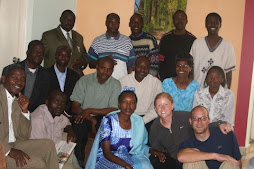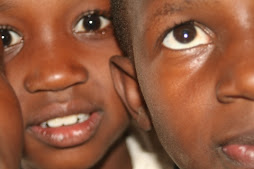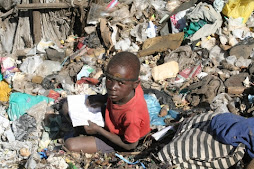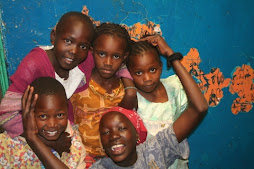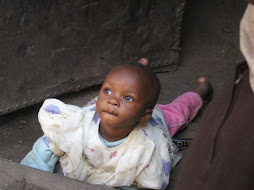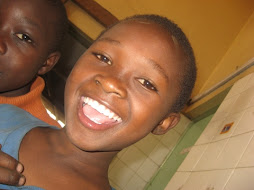Wednesday, October 31, 2007
Amoeba Races
Sorry for the blogging delay. There is not much to report on when you are hampered by an Amoeba in the stomach. We took our first dose of Cipro (The equivalent of carbourator cleaner for the tummy). It takes you down for a bit and then brings you back to life. I guess that stomach egos were slightly uplifted when we learned that the whole house had it and that it wasn't just the white folk. While it did not completely put us down for the count, it was enough to plan for short days and to make sure that a bathroom was close at all times.
One of the highlights of the week was meeting with all of the CTM Network pastors/leaders. Several of them just graduated from a local urban leadership program. We enjoyed the opportunity to celebrate with them in their hard work. It was great to sit in a circle of leaders that have lived their call in commitment to their respective communities. Many of them have had opportunities to “move up” and “out” of the informal settlements but have remained committed to their people. What an admirable and courageous undertaking!
The week of Amoeba would have been complete without the Nairobi 10km! Our week of training leading up to the consisted of walking up the stairs, to the kiosk markets for a Sprite and several trips to the restroom. To our benefit, there were a few glitches in the race that made things a bit easier on our end. The race had a great turnout...about 12,000 runners...most of whom were a bit discouraged by the end of the day. The course for the 10k was an out and back that led us through the finish line within 5-6km. There was no one telling us at that point that we needed to continue through and do an additional lap in the other direction. 90% of the people (including Mandy, Gideon and myself) stopped, walked around a bit in confusion, got a cup of water and then...realized that there was another lap to do. So...we turned up the throttle a bit and finished the last lap of the race. Walking away from the finish line the 2nd time, I looked at my watch and learned that I had just completed a 10km in 33 minutes! The excitement was killed a second later when I realized that there is no way that I was running 5:20 miles. The well deserved buzz from the front runners reamed the race organizers for a poorly managed race. Not to mention, the prize money that was compromised. All mistakes aside, it was a great run and the shirts are great!
Tuesday, October 23, 2007
The Voice of the Children...
Thursday:
Last week, we spent some time at the “Inspiration Center” in Mathare, a slum on the east side of Nairobi. We walked around the area for a couple of hours, ate a delicious lunch in a local hotel (restaurant) and visited the largest school in the slum. It was one of those days when I wished that I could have come home, sat in the electric recliner, read the newspaper and drank a nice cold Black Butte Porter. My exhaustion didn't come as a result of our 5 km walk, nor the scorching sun, but the marathon that my mind completed that day.
It all started when we stepped foot off of the matatu and were greeted by the “How are Yoooouuuuuu!” screams from the nearby children. They don't require a response, just a validation of their limited English vocabulary. If you ever want to boost your ego, this is the place to be as a simple touch of the white skin puts you in Santa's league. The first question that I had to ask myself was, “why in the world are these kids not in school?” With the current presidential elections, politicians are tauting their implementation of free primary school for all kids. Apparently “all” no longer includes a huge chunk of the population under 12 years of age in Mathare.
Moments later, we began walking through the community just to get a simple lay of the land. The feel was starkly different than any of the other slums that we had visited. On our 90 minute walk, I saw 3 churches, two schools, one public restroom and 2 vehicles. Mathare is situated in a valley, so the opportunity for roads is limited but the lack of services was just disheartening. Where are the small, microfinance projects? The churches? The Non Government Organizations (NGO's)? The government? With all do respect for those that are doing things in other needy areas of Nairobi, did this community fall off the map? The walk gave us a pulse for the community...a pulse that was strong yet slightly hardened as there were very few units on standby for any type of resuscitation.
An afternoon walk to the largest school in the area gave us a glimpse of the realities of life in Mathare. Leaders of the Inspiration Center estimated that 700 kids attend the school sitting in the heart of Mathare Valley. In terms of Physical space, I would estimate that the facilities were 150 feet by 200 feet. For those of you that are voting on levy's for school renovations think about trying to pass the construction of buildings like these. We visited several of the classes where kids sang us a song, recited a Bible verse and /or a social issue chant and laughed at us as we stumbled through introductions in Swahili. The walls between the classrooms vary from tin to bed sheets as 40-50 students cram onto the benches with their notebooks. A side note: some of the best schools in all of Kenya are located in the slums as these are the kids that are extremely motivated to surpass societal expectations.
I was reminded of a book whose title I can't remember that was written by a friend and colleague of my brother and sister-in-law in New Mexico. The author, Tim Stewart-posed a question around children being labeled “at-risk”. In short, he asked whether there are any kids in this world that are not at risk of some type of failure. If there is any community that I would label as a haven for producing “at risk” kids, Mathare is it. Yet, under the dirt, the crowded conditions and few services, these kids are survivors. They are determined, have an amazing instinct and can navigate systems with the best of them...while the kids across the way at the embassy school, with everything that they could ever ask for and more may be the ones that are “at risk”.
We will be back at this school again. There was something that was warm, inviting and cozy about it even in the scorching heat. Behind the voices of these children was a source of hope and promise...one that I am “at risk” of missing.
Friday
Following our Swahili lesson on Friday, we joined Pastor Alfred in a community call Kawangware on the west side of the city. He took us to a church which functions as a school during the week and introduced us to the kids. There are 37 kids that attend the one room school ranging from age 3-10. Teachers out there...count your blessings as curriculum development and classroom management for a group like this cannot be a simple task. As the norm here, Mandy was asked to lead a PE lesson on the spot. Given the circumstances of no equipment, a language barrier and getting 3-10 year olds on the same page, she rocked it! These kids pay about $4.00/month to attend the school so that the teacher can be compensated. They are hoping to set up a food program as well so that the kids can have a meal at school. Lunchables, cafeterias and leftovers are not the norm in these parts of the city.
Soon, we gathered for lunch at Alfred's house with his family. 6 people living in a 10 foot by 12 foot space. We got cozy on the couch and enjoyed some Ugali, potatoes and beans followed by two rounds of chai. As guests, you never go hungry here! Shortly after lunch, we saw a girl pass by outside. Alfred mentioned that she is deaf. We explained that Mandy took American Sign Language and that we might be able to communicate with her.
We soon learned that Ruth was 9 years old and was born deaf. She has never been to school, only recently learned how to finger spell and has a very difficult time interacting with her family. Can you fathom what it would be like to not be able to communicate for 9 years? I am sure that she has been able to express herself in some ways, there is no such thing as a Disabilities Act over here, nor are there accessible resources for those that don't fit the norm. Mandy taught Ruth and her father a few signs. We will meet with her family again this week or next to see if we can help arrange for them to enroll her in a school and/or find some resources for them.
When I think about the life of a child in Kenya (I guess anywhere for that matter), the voice plays such a crucial role in discovering yourself and your surroundings. It's a ticket to asking questions, to picking up on social cues and to sharing who you are with the rest of the world. There are no “How are yooouuuu?”s from Ruth. No crammed classrooms with 40-50 kids listening intently to their teachers. No songs...just a glance of curiosity toward her surroundings...for now at least. We'll keep you posted.
Sunday
There is something so beautiful and authentic about a child in song...I have to share a brief story about a little boy names Moses at the Inspiration Center on Sunday. This little guy was a true gift to us. He couldn't have been more than three years old, standing at a proud 30 inches and a smile that pierced through the oppression outside. Moses was one of about 50 kids at a church service of 70 people. Kids galore! When he came into the room, he ran up to me trying to see what mzungu (white person) skin feels like. He ran over and just grabbed my hand, gave me a high five and then just looked up at me. I had a hard time figuring out who he was looking at early on as his head was facing one way and his eyes another...come to find out-my little man Moses is cross eyed. That didn't stop him from giving some wicked high 5's, climbing up onto my lap during the church service and dancing in the aisles during worship time.
I didn't hear many words from Moses, but his actions spoke louder than any keynote speaker that I have heard. He didn't hold back...but instead used his “voice” to welcome us, to make us comfortable and to show what it means to be authentic in the presence of others...particularly in the context of church...where we often feel stifled.
Moses did something for me that day that will help guide my time here in Nairobi. He gave me eyes to see and ears to listen to a Psalm from David that touched me in that place at that moment. His toothless smile, intersecting eyes and weathered clothes helped me articulate a Psalm that is emerging in my mind...although there are many stanzas to this Psalm of Nairobi, this speaks to the context in which I met my little friend.
“To the One who remembered us in our low estate,
His love endures forever.” Psalm 136: 23.
To the Inspiration Center and the communal cross that it carries,
His love endures forever.
To the waves of dung wisping from the neglected toilets below,
His love endures forever.
To the children entering with calloused feet and ugly sweaters,
His love endures forever.
To the little boy whose crossed eyes do not make him blind to worshipful dancing,
His love endures forever.
To the valley below, where moonshine is prepared to intoxicate the city,
His love endures forever.
To the Nissan vans lined up on the street, their bumping systems and careless drivers,
His love endures forever.
To the mother behind me who sits in tension of giving an offering or eating a meal,
His love endures forever.
To the Mark and Moses, who choose to cry with the city instead of for it,
His love endures forever.
To the pastor down the street striking a deal to buy a helicopter,
His love endures forever.
To the landlord, who has not provided electricity for months,
His love endures forever.
To me, who can leave at anytime, and not come back,
His love endures forever.
To the millions of people in Nairobi, dreaming of a better life,
His love endures forever.
To campaigning politicians, soliciting slum votes soon to abandon them,
His love endures forever.
To the drugged rapper meters away whose bitterness prevails in his psalms,
His love endures forever.
To the churches and NGO's who have neglected this community,
His love endures forever.
To you, the reader who has faithfully supported us in this journey,
His love endures forever.
To Mathare,
His love endures forever.
Monday, October 22, 2007
The Weaker Parts
“The most honored parts of the body are not the head or the hands, which lead and control. The most important parts are the least presentable parts. That's the mystery of the Church. As a people called out of oppression to freedom, we must recognize that it is the weakest among us- the elderly, the small children, the handicapped, the mentally ill, the hungry and sick- who form the real center. Paul says, “It is the parts of the body which we consider least dignified that we surround with the greatest dignity.” (1 Corinthians 12:23)
The Church as the people of God can truly embody the living Christ among us only when the poor remain its most treasured part. Care for the poor, therefore, is much more than Christian charity. It is the essence of being the body of Christ.”
Joel and I are here on behalf of Center for Transforming Mission. I am convinced that if the Church, the body of Christ, lived in such a way that we treasured our 'weakest' parts, there would be true transformation. I guess another way to ask the question is: “If we (The church: those who claim to be made in the image of God and to be living for Him) are not considering these weaker members with the greatest dignity, then who will?
Peace,
Mandy
Wednesday, October 17, 2007
The race is on...
-I would guess that 70% of the televised news has to do with the elections at this point. Another 10% goes to soccer followed by a bit of local news. We joke that the stations will have no news broadcasts after the elections are over.
-Newspapers are sold on the sides of the road at market stands. Every morning, when a new issue comes out, there are 5-15 people gathered around each newspaper to learn or the latest election news. We have not seen any newspapers without election news on the front page. Everyone is interested...young, old, male, female, white collar, no collar-everyone.
-60% of Nairobi's 4.5 million people live in informal settlements (slums). While there are some exceptions, the vast majority of these people are living in financial poverty...I will clarify “financial poverty” at some other point. As you can imagine, $1000/plate fundraising lunches are not the norm in this neck of the woods. No candidate will stand a chance without appealing to the majority of his/her people living in the slums of Nairobi.
-Although there are 150-200 parties running for president, two main parties have emerged...PNU (People's National Unity-which was created about 3 weeks ago built around the current president) and ODM (the Orange Democratic Movement which was developed to encourage change and the formation of democracy in Kenya's political system).
-Rather than red states and blue states in Kenya, there is an issue around tribalism. Because Kenyan culture is rooted in place and community, people vote for leaders based on where they are from, which tribe they are a part of and who they associate with. This issue is evolveing quickly as people continue to move into cities permanently.
-The current president has the final say in when the elections will be held. There is an obligation to hold the elections prior to January 1, 2008 but if it would be advantageous to hold the elections earlier, the current president has the power to do so.
-The poles as of Saturday, October 13: Kibaki (PNU-current president) 37%, Raila (ODM) 53% and Musyoka (Another ODM Candidate) 9%
As of now, the time leading up to the elections has been peaceful. We hope and pray that this will continue as historically this has not the case.
Floating thoughts...
This is a verse that I have found myself meditating upon this week. It's to the point and easy to remember which may be the reason why it comes to mind so easily.
Joyful in hope: It's amazing how if I chose to be joyful in the hope I have, if I stop to recognize that my life is full of hope...my perspective will change. Many people here are teaching me this lesson so well. Their lives are less than desirable in many respects, and yet they are so full of joy. They get it. They see God in such a way that fills them up with the joy of the hope that He gives. Wow.
Patient in affliction: I again am humbled by what I find 'afflicting.' Maybe it's a headache or a person who I don't get along with. I have yet to deal with the affliction of watching my child go hungry each day, or of being suppressed by the government that is supposed there to 'serve the people,' or the affliction of working for an unjust boss that refuses to pay his workers a fair wage. Many of you have read “The Kite Runner” and I think of Hassan, a character in the book who I feel exemplifies the idea of 'being patient in affliction,' and there is something so beautiful about a person who endures pain with out complaining. I don't think this means to just sit back and take it... but when the affliction is beyond my control, the way that I deal with it will say a great deal about my character. I desire to become a person who is patient in affliction.
Faithful in prayer: It is so easy in America to forget to pray... It is so easy in Nairobi to forget to pray. When my eyes are closed to the suffering around me and even within me, I am not faithful in prayer. When I open my eyes and truly see the condition of my heart and of those around me, I find my only reaction is to pray. It is my prayer that my eyes will stay open, that I refuse to be blind to the hurts of others, that I don't look the other way and hope for the best. The question I must ask myself when I pray is: Am I listening? ... a true listening post. How does God see this situation, what is His take on everything? What is He asking us to do? Wow. If only we listened to you Lord, forgive us.
These are just some thoughts floating around this head of mine...
Mungu Akubariki,
Mandy
Saturday, October 13, 2007
The nuts and bolts of CTM Nairobi
The Center for Transforming Mission
Many of you have asked what it is that we do over here. Prior to our arrival in Kenya, we didn't feel that we were in a position to answer that question. 5 weeks later, I think we can give you a snapshot of what the organization looks like in Kenya as well as how we fit into the grand scheme.
CTM is a non-profit based out of Tacoma that works to develop grassroots leaders in hard places. What do I mean by hard places? When I think of hard places, I think of the parts of town that you and I try to avoid after dark, places that no not have well-developed infrastructures and places where passionate people are left to care for the people because no one else wants or dares to. The idea behind CTM emerged from inner-city Philadelphia but has since expanded to support urban leaders in several cities around the states, in central America, Thailand and now, Nairobi. It looks different in each of these areas depending on what the “hard place” is in each respective place. In central America, the overlooked population deals with gang members that have been sent to prison, in cities around the states, the urban centers that no one wants to get their hands dirty with and in the case of Nairobi, the slum areas where leaders are not well-supported by organizations or churches but feel a call to reach out to communities in dire need of transformation.
CTM is not a program-based organization, but focuses on building capacity amongst what already exists through trainings, further education and bringing leaders together to create a network of peers. In many parts of the world, organizations are not 501c3's with advisory boards, endowments and long range plans but instead one or two people that see a need and have a desire to meet it. CTM recognizes this and looks to support these small organizations and churches whose work is imperative in transforming communities.
In our particular situation, Gideon (the CTM Nairobi Director) works 30-35 grassroots leaders throughout Nairobi that are working in hard situations in and around the city. He is a support for them by checking in with them regularly, pulling them together on a monthly basis to discuss challenges, celebrating their successes and providing local and international training opportunities through the US CTM office.
Over the past month, we have spent out energy on getting to know some of the pastors/leaders in the network and learning more about their work. We are now entering a stage that will allow us to pour more time and energy into specific areas and enhance the support that CTM can provide.
A few of our focal points:
Work with two leaders (Mark and Moses) that are working in a community called Mathare. This is a slum that it seems that no one is paying attention to. In many of the slums, there are lots of churches and NGO's, yet it seems that Mathare has reaped the benefits of neither of these. We are exploring setting up the CTM office in Mathare part-time in order to find ways to partner with them and support them in their work.
Another group that is often neglected in hard places is the 14-24 year old age group. Since high school is not free and many come from disjointed families, this poses to be a difficult time in life. CTM is partnering with a local non-profit called Real Stars to sponsor kids to go to high school while also providing a complimentary leadership development program that takes place over 3-one week intensives over their 4-year high school experience.
We are in conversation with Carlile College to provide a formalized educational opportunities for slums in the area. Carlile takes pastors through a 2 year certification program to help them in their respective areas. CTM is looking at the possibility of a partnership with Carlile and Bakke Graduate University (A Seattle-based Theology school) to provide a master's level program for the pastors working in slums communities.
This is the work of CTM in a nutshell. If you are interested in learning more about it, please check out the website at www.ctmnet.org.
2x4's
Notty pines, nor warping
Not the sticks that builders use, Nor the 1 ¾ x 3 ½ deception to save a penny.
2 meters x 4 meters
A dwelling. A house. A home.
4-5 adults and children.
Sleeping side by side.
Windows in the mud walls are not an option.
The sun fries the tin roof cooking the contents.
Karibu (Welcome) is what they say.
Sit down on our lone couch, while I make us Chai or buy us Fanta
Beds, a shelf, coffee table and couch-each square foot is used.
A TV in the corner
A light in the center which works on occasionally
The yellow water buckets carried from who knows where
A smile, their best English
Our best Swahili
Her it comes-Chai and bread followed by a plastic bin to wash our hands
We bless it
We eat it
We laugh and share.
We pray.
We leave. They stay.
Back to our 2x4 bedroom we go
1 Room in a house of many
2 people
Windows
Cement walls keep us cool
1 bed, many shelves, a desk and chair
3 lights
a bathroom-running water
The door is closed
We are sleeping.
Wednesday, October 3, 2007
Pace, Power and Providence
Pace, Power and Provision
On Saturday, we enjoyed the Night of Champions Track event in Nairobi. It was the first international track meet that Kenya has ever hosted and drew some of the top runners from all over the continent. Although supported by Tusker (Kenya's equivalent to Budweiser), it was a big step for Nairobi as event planners have historically stayed away from large events at night because of the potential for violence. I have never seen anything like it before...they were hauling! 3:40 for the 1500 and 7:40 for the 3000 meter races. Can you imaging the kind of pace that one would have to maintain to do that? It's interesting to think about where sports have come from and where they have taken us. With illegal enhancers in the Olympics, the Tour de France and just about every major sporting league, one can argue that we are wasting our time and resources on such events. Our night under the lights was a refreshing example of how athletes can compete on behalf of a family, a tribe and a collective nation to share a talent with others, to overcome adversity and to combat the lies of unethical competition.
We have had several interesting conversations lately around some of the cultural differences of Kenya and the states. It has allowed us to understand a bit more about how to interpret cues from others, which areas to be sensitive to when interacting with Kenyans and has highlighted some things that many of us have never been forced to think about. In particular, I was drawn to an interesting conversation around the role of power in establishing independence. Let me explain. It is no secret over here that most western nations are independent in nature. We like space, freedom, fences and oppose carpools, sharing rooms and cell phones and sitting in the seat next to someone when there are others that will allow us to be further apart. Where did this mentality come from? The Native Americans didn't think this way, neither do some minority groups. It was brought to my attention that independence can often be equated with a certain amount of power. When one develops enough power, he or she does not feel the need to rely on others, to create a communal voice or to represent others in his or her opinion. I remember during the first day of classes when we were instructed how to contribute to classroom discussions by using statements like, “I feel that” or “I think that” as a way to make others feel comfortable, to not generalize on behalf of others and to make a clear distinction that it was my opinion that I was sharing. Even last week at a conference with 50-60 African leaders, I often heard the terms “we” and “us”. It was a collective plea for power, in community. The next time you are offended because someone uses you as a guinea pig and speaks on behalf of a collective, consider the implications. Most of the time, you can say, “I think...” but with that comes an understanding that you have somehow acquired the power to represent yourself...independently.
Yesterday morning, Mandy, Gideon and I sat down for 4 hours and spoke about what we were seeing and hearing as we begin to create a vision for our time in Kenya. It has almost been a month already! Our conversation was a reality check in that there is a lot to do, that American long range plans and agendas do not work over here and that our goal is to be adamant about finding ways to fill niches that exist in serving the least, last and lost of this community. In the context that I come from, there is an organization serving all of the needs that you could think of. Not to say that there aren't problems, but it is often not because of a lack of people trying. If you want to start something new, you find a specific area that you can dig into and stay focused. Well, let me welcome you to Kenya, where niches are enormous, needs are prevalent and all organizations do a little of everything. In some ways, this is daunting, while in others it is empowering. Gideon has a warm heart for this area and his gentle spirit has allowed him to encounter an array of people that will allow him to further his ministry. As we look ahead, we will be focusing on putting some structures in place that will allow CTM Nairobi to succeed in its mission to serve leaders in the slums, to raise up a generation of youth that can tell their story in a world that doesn't want to hear it and help mainstream churches and organizations see the value of those that are working in extremely difficult places...where the pay sucks, where the outcomes are often never seen and where it takes work to see Joy. We ask for provision in discerning these questions.
Peace,
joel
